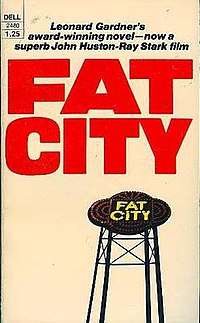Fat City (novel)
Fat City is a novel by Leonard Gardner published in 1969. It is his only novel. Its prestige has grown since its publication, due to critical acclaim from Joan Didion and Walker Percy, among others. The book is widely considered a classic of boxing fiction.
 | |
| Author | Leonard Gardner |
|---|---|
| Country | United States |
| Language | English |
| Genre | Sports novel Tragedy[1] |
| Publisher | Farrar, Straus & Giroux |
Publication date | 1969 |
| Media type | Print (Hardback & Paperback) |
| Pages | 183 pp (Hardback first edition) |
Plot summary
Set in the small-time boxing circuit of Stockton, California, in the late 1950s, the novel concerns the revival of a semi-retired Billy Tully's career and the first fights of a novice, Ernie Munger. At twenty-nine years old and discouraged not only by his defeat to another lightweight fighter in Panama, but also from the desertion of his wife two years earlier, Tully meets Munger at the local YMCA and remarks on his talent, suggesting he visit his former trainer Ruben Luna.
Disgusted by his lack of fitness and power, Tully entertains the idea of returning to the ring in a bid to reclaim his self-respect and possibly his ex-wife. Munger meanwhile impregnates his girlfriend, Faye, and marries her out of obligation, vowing to support his young family by winning fights. After losing his first amateur bout he attains some success and, despite his anxieties about marriage, seems poised to ascend the circuit ranks. Tully, meanwhile is wracked by uncertainty and divides his time between working as a low-paying farm laborer and drinking heavily in seedy bars and motels. After a brief affair with an alcoholic barfly named Oma, Tully strengthens his resolve and makes a concerted effort to prepare for a fight with a moderately well-known but aging Mexican fighter named Arcadio Lucero.
Tully narrowly wins the fight on a bill with Munger, who is also victorious in his professional debut. Though momentarily bolstered by his victory, Tully pines for Oma, his ex-wife, or any woman, realizing that his career is over and the past can not be reclaimed. Alone and without any future prospects, he descends into an abyss of inebriation, becoming just another unshaven face at the bar recalling former greatness. Munger continues to fight and, hitchhiking home from a fight in Salt Lake City alone, he is picked up by two young women who eject him from the car on a stretch of highway in the dark of night after an awkward exchange revealing Munger's lustful longing. The novel ends with the suggestion that Ernie Munger may be starting down the same desperate and well-worn path as Billy Tully.
Meaning of title
In a 1969 interview with Life magazine, Leonard Gardner explained the meaning of the title.
"Lots of people have asked me about the title of my book. It's part of Negro slang. When you say you want to go to Fat City, it means you want the good life. I got the idea for the title after seeing a photograph of a tenement in an exhibit in San Francisco. 'Fat City' was scrawled in chalk on a wall. The title is ironic: Fat City is a crazy goal no one is ever going to reach."[2]
Film adaptation
The novel was adapted into a celebrated film of the same name by John Huston in 1972.
References
- Meehan, Ryan (4 September 2009). "The Frontiers of American Tragedy". Thecrimson.com.
- Durham, Michael (29 August 1969). "A short talk with a first novelist". Life Magazine. 67 (9): 10.